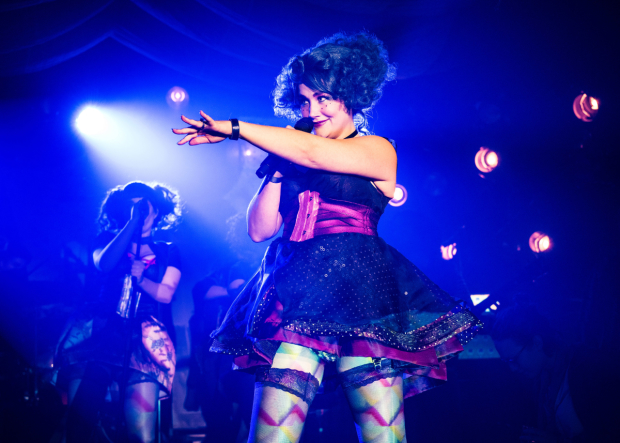
(© Ben Arons)
The Wildness just may be the most delightful cult meeting you'll ever attend. There's collective chanting, blindfolding, and candy consumption — and if you're one of the "Brave Ones," you might even have the chance to bear your soul to a bunch of strangers. If shared emotions and therapeutic affirmations are too demonstrative for your liking, The Wildness may not be the cozy theatrical "escape" you're looking for. But for the wandering artists who typically make their way over to Ars Nova's experimental venue, there is a roomful of kindred spirits just itching for the chance to tell you "you are not alone."
Like a passion play for "agnostic, generally apathetic millennials" (as co-creator and star Lauren Worsham describes herself and her comrades), The Wildness, presented in collaboration with The Play Company, is predominantly a metaphorical fairy tale about the terrifying journey we all take from childhood to adulthood. However, we're made abundantly aware that Worsham (best known for her Tony-nominated performance in A Gentleman's Guide to Love & Murder) and her indie-pop band Sky-Pony are the ones telling us this story.
The opening blood-pumping number entitled "The Lost Ones" sets the backstory of "The Wildness," an annual tradition of debauchery where Worsham and her artist pals purge themselves of their crippling doubts and fears. Someone named Michael is credited with initiating these cleansing meetings and introducing the crew to a fairy tale he created in childhood — a story that in turn led to the characters and catchy songs we experience throughout the performance. Michael unfortunately has gone missing, Worsham casually mentions. But the show must go on, and his sister Lilli (Lilli Cooper) has graciously stepped in to perform his role.
For those already opening up a Google search, Lilli Cooper does not have a sibling on a missing-persons list, nor is there any Michael credited in the program. Few shows blur the line between fact and fiction better than The Wildness, whose pretense of "reality" turns out to be just as fantastical as the fable it tells with rock lighting (by Brian Tovar), crazy blue wigs, and larger than life costumes (playfully designed by Tilly Grimes). Yes, the pregnant belly Worsham blithely calls attention to is real (she and the show's talented composer Kyle Jarrow are in fact expecting). And the two poor souls (the "Brave Ones" mentioned above) picked out of the audience to contribute "overshares" (public confessions of private doubts) are also genuine additions. But everything else — including the cast's own seemingly unrehearsed overshares — toy with our emotions as we constantly second-guess the boundary between the impromptu and the scripted.
With the help of his impeccably convincing cast (which also includes beautifully authentic performances by Katie Lee Hill and Sharone Sayegh), director Sam Buntrock cleverly maintains this constant state of imbalance as he weaves in and out of the narrative at the show's center. The "Fairy Tale in Twelve Parts," as it is irreverently called, is set in a village presided over by a powerful Ruler (strikingly portrayed by cellist David Blasher) and his daughter Ada (a majestic and vocally powerful Cooper). When the village's well water begins making the townspeople sick, Ada and her devoted follower Zira (Worsham, whose rock vocals are just as flawless as the legit soprano she brought to Broadway) search for help in the surrounding area called The Wildness — a place they've never dared to explore but believe to be populated by evil creatures. Here, they learn the truth of what has always lied just outside their homey confines and discover the complexities that accompany their transition to adulthood.
Cooper and Worsham make for a mesmerizing pair of heroes, balancing mature performance with the childlike innocence of a game of dress up. After all, that is essentially what The Wildness is — a cathartic game of make believe where you can venture into uncharted territory without permanent consequence. Together, they explore this new world and its unknown rules, with nostalgic footage of childhood toys animating the journey (courtesy of Alex Basco Koch's wonderfully crude projection design). As these kiddie games gradually merge with the adult "reality" the company so skillfully builds around our heads, the result is a tragic catharsis that will make you yearn for the simplicity of the past, yet communally embrace the confusion of the present.








